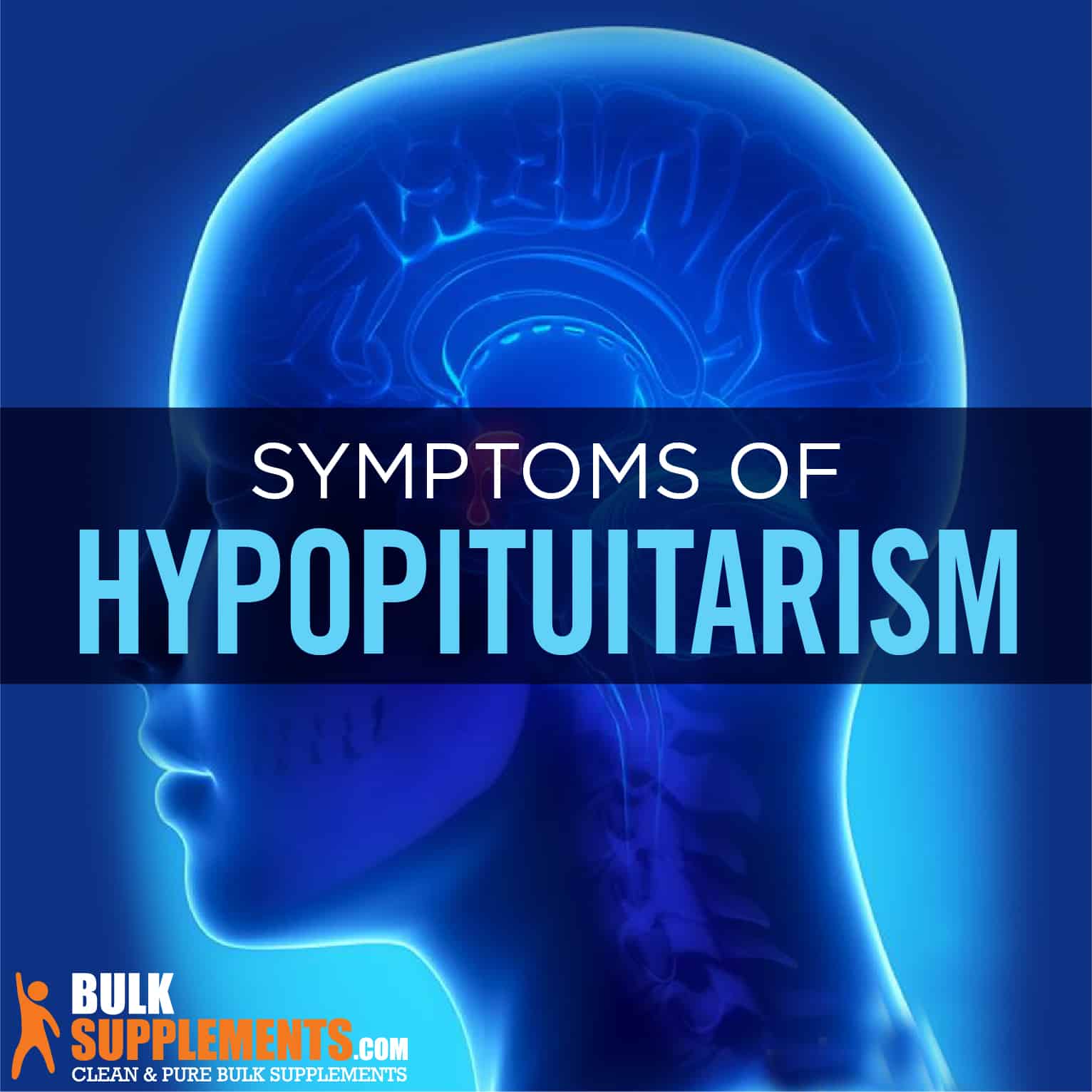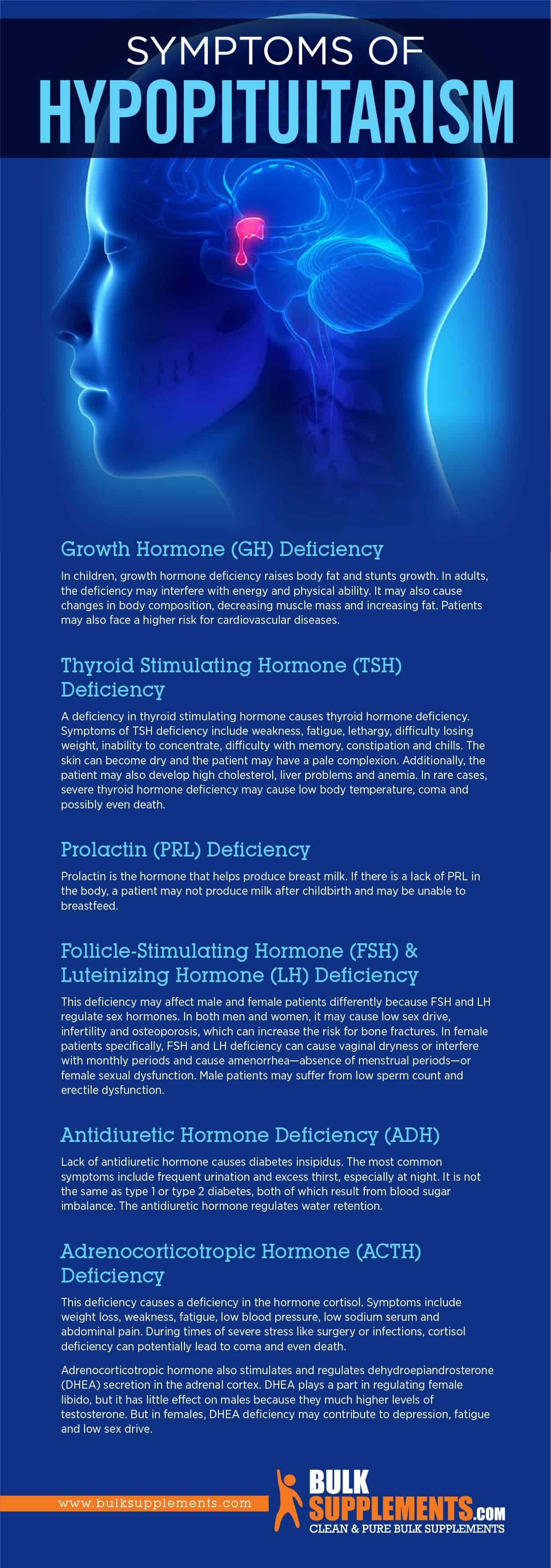Hypopituitarism: Causes, Symptoms & Treatment
by James Denlinger Digital Marketing Strategist
What is Hypopituitarism?
Hypopituitarism is a medical condition in which the pituitary gland does not produce enough hormones. Located in the brain between the hypothalamus and the pineal gland, the pituitary gland is the master gland in the human body. It is responsible for producing various hormones that the body needs to function, including:
- Growth hormone (GH) – controls growth and metabolic processes
- Oxytocin – essential during labor, delivery and lactation
- Prolactin (PRL) – stimulates breast milk production
- Antidiuretic hormone (ADH) – controls blood pressure and water retention
- Thyroid stimulating hormone (TSH) – regulates hormone production in the thyroid gland
- Follicle-stimulating hormone (FSH) & luteinizing hormone (LH) – regulate primary sex hormones
- Adrenocorticotropic hormone (ACTH) – regulates vital stress hormones dehydroepiandrosterone (DHEA) and cortisol in the adrenal gland
A patient with hypopituitarism lacks at least one of these hormones in their pituitary gland. As a result, the individual experiences hormone deficiencies in the body.
Hypopituitarism Symptoms
Hypopituitarism symptoms vary, depending on which hormones the patient is missing. Each different deficiency causes its own set of symptoms.
Growth Hormone (GH) Deficiency
In children, growth hormone deficiency raises body fat and stunts growth. In adults, the deficiency may interfere with energy and physical ability. It may also cause changes in body composition, decreasing muscle mass and increasing fat. Patients may also face a higher risk for cardiovascular diseases.
Thyroid Stimulating Hormone (TSH) Deficiency
A deficiency in thyroid stimulating hormone causes thyroid hormone deficiency. Symptoms of TSH deficiency include weakness, fatigue, lethargy, difficulty losing weight, inability to concentrate, difficulty with memory, constipation and chills. The skin can become dry and the patient may have a pale complexion. Additionally, the patient may also develop high cholesterol, liver problems and anemia. In rare cases, severe thyroid hormone deficiency may cause low body temperature, coma and possibly even death.
Prolactin (PRL) Deficiency
Prolactin is the hormone that helps produce breast milk. If there is a lack of PRL in the body, a patient may not produce milk after childbirth and may be unable to breastfeed.
Follicle-Stimulating Hormone (FSH) & Luteinizing Hormone (LH) Deficiency
This deficiency may affect male and female patients differently because FSH and LH regulate sex hormones. In both men and women, it may cause low sex drive, infertility and osteoporosis, which can increase the risk for bone fractures. In female patients specifically, FSH and LH deficiency can cause vaginal dryness or interfere with monthly periods and cause amenorrhea—absence of menstrual periods—or female sexual dysfunction. Male patients may suffer from low sperm count and erectile dysfunction.
Antidiuretic Hormone Deficiency (ADH)
Lack of antidiuretic hormone causes diabetes insipidus. The most common symptoms include frequent urination and excess thirst, especially at night. It is not the same as type 1 or type 2 diabetes, both of which result from blood sugar imbalance. The antidiuretic hormone regulates water retention.
Adrenocorticotropic Hormone (ACTH) Deficiency
This deficiency causes a deficiency in the hormone cortisol. Symptoms include weight loss, weakness, fatigue, low blood pressure, low sodium serum and abdominal pain. During times of severe stress like surgery or infections, cortisol deficiency can potentially lead to coma and even death.
Adrenocorticotropic hormone also stimulates and regulates dehydroepiandrosterone (DHEA) secretion in the adrenal cortex. DHEA plays a part in regulating female libido, but it has little effect on males because they much higher levels of testosterone. But in females, DHEA deficiency may contribute to depression, fatigue and low sex drive.

Causes of Hypopituitarism
Patients with hypopituitarism have a deficiency in at least one pituitary hormone. Hormone deficiency causes dysfunction in the organ or gland that the hormone regulates. There are several different factors that may interfere with hormone function and cause hypopituitarism.
Trauma
There are several forms of trauma to the brain that can trigger hypopituitarism, including a brain tumor or brain surgery. Tumors on the hypothalamus or pituitary gland, as well as radiotherapy to the brain, can also trigger the disorder. A traumatic head injury or stroke may also cause it or the condition may result from a ruptured aneurysm. The patient may also suffer from inflammation or an infection in the brain tissue or pituitary apoplexy which results from dead tissue in the pituitary gland.
Metabolic or Immune Conditions
Sometimes, hypopituitarism results from metabolic or immune system conditions. However, these causes are not as common. For example, lymphocytic hypophysitis is an autoimmune disorder that causes inflammation in the pituitary gland and histiocytosis X increases immune cells called histiocytes. Both of these conditions may interfere with pituitary gland function. In addition, a condition called hemochromatosis can develop if the patient has too much iron in the body and sarcoidosis causes inflammation in the tissue and organs.
Sheehan Syndrome
In addition, hypopituitarism may be a rare complication from heavy bleeding during pregnancy. This blood loss destroys tissues in the pituitary gland and interrupts its function. This condition is called Sheehan syndrome.
Medicines
Certain medicines may also impair pituitary function. These may include glucocorticoids and prostate cancer drugs. Glucocorticoids are the most common medications that can increase the risk for hypopituitarism. They are designed to help treat immune and inflammatory disorders.
Hypopituitarism Treatment
To treat hypopituitarism, a physician will first identify the underlying cause. This may help restore the pituitary gland’s ability to make hormones.
Surgery and Radiotherapy
Some patients may require surgical procedures to treat hypopituitarism. For instance, when dysfunction in the pituitary is caused by a brain tumor, the tumor may require removal. The patient may also have a small, noncancerous tumor (microadenoma) that causes the condition, but these usually do not need to be removed unless there is also over-secretion of ACTH hormone or growth hormone. But larger tumors may require removal because they may cause various complications. A surgeon may use either surgery or radiotherapy to remove the tumor.
Hormone Replacement Therapy
However, some procedures are not completely successful. In some cases, the patient’s body still does not produce sufficient pituitary hormones. The patient may need hormone replacement therapy to help stimulate hormone production. Hormone replacement medications include somatropin to replace growth hormone; estrogen, testosterone or a progesterone-estrogen combination to regulate sex hormones; corticosteroids or desmopressin to replace ACTH; or levothyroxine to replace thyroid hormones. Hormone replacement therapy is often successful in managing hypopituitarism.
Supplements for Hypopituitarism
Patients also have the option to take dietary supplements to support pituitary function and hormone production. However, always consult a doctor before starting a supplement regimen. Supplements do not cure hypopituitarism or any other medical condition. Instead, they aim to improve overall health.
L-Arginine
L-Arginine is an amino acid that may enhance hormone production, including growth hormone and possibly help reduce hypopituitarism symptoms. It may also help heal wounds, balance bodily fluids, increase sperm production and relax blood vessels.
To help the body produce and expend more L-Arginine naturally, eat healthy sources of protein like grass-fed beef, cultured yogurt, free-range eggs, organ meats and liver, pasture-raised poultry, walnuts, almonds and wild fish. As a dietary supplement, the recommended dose for L-Arginine base is 750 mg three times a day on an empty stomach. But individual needs can vary. Make sure to consult a doctor for approval before taking this supplement.
Glycine
This amino acid plays a vital role in human hormone production. Studies indicate that glycine is beneficial for forming enzymes and hormones. It is very important for growth, including bone and muscle health. The recommended dosage for glycine powder is 100 mg up to three times a day, unless a physician advises against it or instructs a different dosage.
Ginseng
Although ginseng is popular for its ability to temporarily boost energy and focus, the extract may also help promote male and female sexual health. It may help improve libido and improve sexual function in premenopausal stages. The recommended serving size for American ginseng extract powder is 1,000 mg once or twice per day. Consult a physician before taking the supplement.
Ashwagandha
Ashwagandha is an herbal extract that contains anti-inflammatory properties and researchers believe it may be able to help improve focus and concentration in conditions like Alzheimer’s and Parkinson’s disease. It may also improve sexual health and relieve anxiety. As a dietary supplement, the recommended dose for ashwagandha extract powder is 450 mg up to three times a day, or as recommended by a doctor.
Astragalus Root
Astragalus is a family of plants that contains mostly small herbs and shrubs. Most of the time, they grow in temperate climates in the Northern Hemisphere. For centuries, Chinese and Persian cultures have used it in traditional medicine practices. It can help support the immune system and produce antibodies to fight viruses and bacteria. As a dietary supplement, take 1,300 mg of astragalus extract powder per day with meals, or as instructed by a doctor.
The Bottom Line
Hypopituitarism is a disorder in which the pituitary gland doesn’t produce adequate hormones. The pituitary gland produces and secretes growth hormone, thyroid stimulating hormone and prolactin. It also regulates hormone levels that other glands produce and secrete in the body.
Hypopituitarism symptoms are many and varied, depending on the hormone(s) missing. They include fatigue, nausea, constipation, infertility, depression, unexplained weight changes, increased thirst or frequent urination and changes in sex drive. Hypopituitarism most commonly occurs from tissue damage or inflammation in the pituitary gland. Patients may have brain tumors, head trauma or another injury that cause it. Hypopituitarism may also result from more uncommon autoimmune or metabolic disorders.
Treatment includes surgery to remove any tumors that may cause the condition or hormone replacement therapy to help stimulate hormone production. However, treatment ultimately depends on the underlying cause and which hormones the patient is missing. Patients may also find dietary supplements beneficial. Some supplements can help with hormone production, but they are not a cure for hypopituitarism or any other medical condition. Consult a doctor before starting a supplement regimen.
Sponsor Ads
Created on Mar 1st 2020 16:24. Viewed 428 times.



